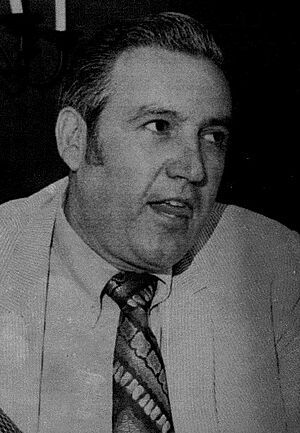Roy Rubin (basketball) facts for kids

Rubin in 1972
|
|
| Biographical details | |
|---|---|
| Born | December 9, 1925 The Bronx, New York, U.S. |
| Died | August 5, 2013 (aged 87) Miami, Florida, U.S. |
| Playing career | |
| 1950–1951 | Louisville |
| Position(s) | Guard |
| Coaching career (HC unless noted) | |
| 1961–1972 | Long Island |
| 1972–1973 | Philadelphia 76ers |
| Head coaching record | |
| Overall | Long Island: 174–94 (.649) NBA: 4–47 (.078) |
Roy Rubin (born December 9, 1925 – died August 5, 2013) was a basketball coach. He coached both college and professional teams during his career.
Contents
Becoming a Basketball Coach
Roy Rubin played college basketball at the University of Louisville from 1949 to 1951. After his playing days, he became a coach.
He first coached at Christopher Columbus High School in New York City. There, he led his team to win six championships in nine seasons. Rubin was known for his strong focus on defense. He even wrote a book about how to play defense well.
Later, he became the athletic director and head basketball coach at Long Island University (LIU). He coached at LIU for eleven seasons, winning 174 games and losing 94.
Coaching the Philadelphia 76ers
In 1972, Rubin got a big chance to coach in the NBA. He signed a three-year contract to lead the Philadelphia 76ers. The team had been struggling and needed a new coach.
The 76ers had won an NBA championship just six years earlier. But by 1972, they were not doing well. They even placed an ad in a newspaper to find a new coach!
Rubin joined a team that was very different from its championship days. Many of the star players had left. The team started the season by losing 15 games in a row. It took him a whole month to get his first win.
After 51 games, the team had only won 4 games and lost 47. This was a very tough start. Rubin was fired on January 23, 1973. At that time, the team was in the middle of a 20-game losing streak.
Some players felt that Rubin was not ready to coach an NBA team. They said his practices were not well-organized. They also felt he did not give helpful advice during games. One player, Fred Carter, later said that letting Rubin coach the Sixers was "like letting a teenager run a big corporation."
Beyond Basketball: A Broadway Show
Before coaching the 76ers, Roy Rubin was involved in something different. He was one of the producers for a Broadway comedy play. The play was called Tough to Get Help.
It opened on May 4, 1972. However, the play did not get good reviews. It closed after only one performance.
Later Life
After his time with the 76ers, Roy Rubin moved to Florida. He never coached basketball again. He eventually owned a restaurant called International House of Pancakes.
Roy Rubin passed away from cancer in Miami in 2013. He was 87 years old. He was survived by his wife, Marsha.
 | Kyle Baker |
 | Joseph Yoakum |
 | Laura Wheeler Waring |
 | Henry Ossawa Tanner |

